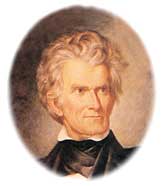 |
Who Yale HonorsBerkeley
College |
Calhoun's Political Influence
On Friday, February 19, 1847, he rose to speak in the U.S. Senate and declared:
What does one make of Calhoun's declaration that he "would rather meet any extremity upon earth than give up one inch of our equality"? For Calhoun, "equality" meant the rights of individual states to decide for themselves whether to permit or prevent slavery. For Calhoun, "equality" meant that the U.S. government had no right to outlaw slavery, and no right to recognize a universal human right to freedom. To prevent federal involvement, Calhoun states his preference for "any extremity upon earth," a statement that many of his colleagues would interpret as threatening. It is as if Calhoun says: Do not meddle in our affairs, or there will be extreme consequences. The fight to preserve slavery was fought as a battle for "States' rights," especially over the rights of newly admitted states to permit or prevent slavery. As Whig senators contested the admittance of any slave territory to the Union, Calhoun leapt into action. Of the senatorial triumvirate that decided many of the key questions of the day--Senators Calhoun, Clay, and Webster--Calhoun was often the most extreme, fiercely defending the rights of slaveholders to bring their slaves to the newly established territories and the right of slave states to belong to the Union (58). For example, Calhoun objected successfully to the admission of Texas as a free state in the Union, on the grounds that Texas would become the home of runaways from slave states (59). Calhoun also persuaded the U.S. Senate to ensure that slaves on foreign soil would be returned to their owners. Years later, he successfully lobbied Congress to limit black people's participation in the military. He argued that "it was wrong to bring those who have to sustain the honor and glory of the country down to a footing of the Negro race-to be degraded by being mingled and mixed up with that inferior race" (60). Part of his argument for supporting slavery was that true capitalism thrived best under slavery and true democracy was not worth pursuing.
|
|
 Calhoun
exercised his 40 years of national political leadership proud to be
a
Calhoun
exercised his 40 years of national political leadership proud to be
a